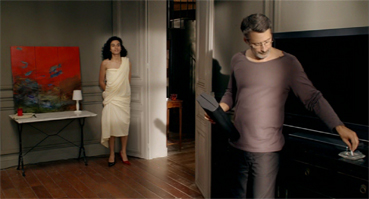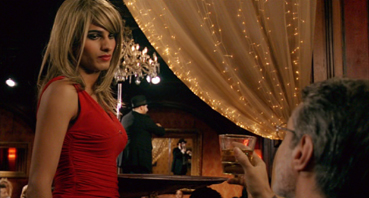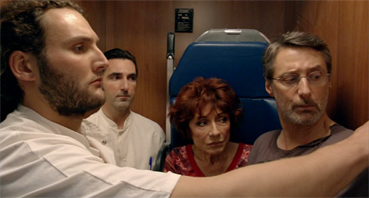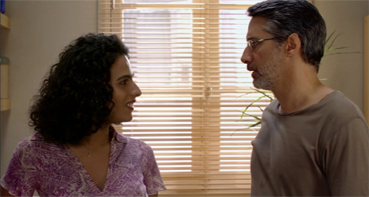|
He's My Girl is that strangest of sequels. One that nobody was ever really expecting, and in any event, hardly clamoring for. Unlike those of the Hollywood machine and its most unnecessary examples (Bad Boys II was released ten years after the theatrical bow of its predecessor, which provided little or no set-up for a sequel), it's hard to accuse Jacques Zilbermann's French follow-up over a decade later, of being motivated by the bottom line of a sure thing bet in cold hard cash. Leading man Antoine de Caunes' Cesar nomination aside, at the time, the original Man is a Woman didn't exactly make the world stage cultural indent of say, Jean de Florette and its companion piece, Manon des Sources, both now considered necessary primers for those only starting to get into French cinema. So why have the director and star decided to reunite all these years later and expand on a story that didn't scream sequel? I suspect that Antoine de Caunes, having strayed from cinema for the most part since the original and now being more widely recognized as the host of nineties TV sketch show Eurotrash, wanted something as comfy as old gloves for a big screen return that would put him front and center. As for director Zilbermann, Man is Woman remains his principle cinematic contribution all these years later, so going back to the well is perhaps as much an indicator of an attempt at profile-raising as it is a sign of creative dearth. Still, there's something unusually quaint about a sequel which exists as an excuse for an old creative team to get reacquainted instead of being born out of fiscal desperation.

Reprising his role of Simon Eskenazy, previously trapped in a marriage as a closeted homosexual, the Jewish Jazz musician is now on easier terms with his lifestyle; openly gay and no longer wrestling with the familial repercussions of the revelation. Indeed he seems to have traded in quiet repression for snarky callousness. From the second he swishes on screen, it's clear this is someone who equates the sum of a delectable physique, naughtily appealing face, impressive torso and nice ass as adding up to something equaling charisma, a disconnect from reality corroborated by everyone in the film but surely no-one in the audience. No matter the amount of high-spirited Klezmer jazz on the soundtrack that hard sells this as light farce, I wasn't buying it for a moment. Eskenazy's bachelor was too selfish for me to ever be charmed by him or the film surrounding him.
His latest lover-at-arms-length is crossing-dressing Naim, passing for a female waitress at the local watering hole. It's quickly established that the couple's intimacy is struggling to transcend the physical, when Simon is seen kicking Naim out the morning after. He has his fun and then is off to the greener, younger pastures of student Raphael, who is seeing Simon behind his girlfriend's back, and with whom he has a very one-sided student-teacher relationship of an altogether different kind. Though we never witness them consummating the act, embarrassed stolen kisses in public have an implicit violence to them. Raphael is clearly not ready to be outed, but this appears to matter little to Simon, so long as he's getting what he wants. Moreover, he actually seems to enjoy getting Raphael all flustered while they're out and about, doing his best to make what Raphael is trying to hide patently obvious. Every time he puts his mouth to the young boy's it's as if he's taunting him, pushing and shoving like a schoolyard bully. Predatory in his sexual advances, Simon is also glib in response to the same sexual confusion he once had to deal with himself.

Where Raphael is intimidated by Simon and clearly no match for him, Naim takes his casual cruelty in his stride, doting on him and making himself comfortable in his lover's home (not wanting to interrupt his bath when Simon's mother turns up unexpectedly) in a manner that suggests he's keen to move in even when Simon is kicking him out at dawn's early light, we suspect not for the first time. We enter the story at a point where this has happened enough times to have already broken the camel's back. Naim gives as good as he gets, not wanting to take anymore of Simon's shit, but in spite of this, he just doesn't know how to quit him.
At a crossroads, Naim finds the necessary excuse to carry on with Simon and move in to his home when Simon's mother, Bella is injured in a way that leaves her bed-bound and the doctors relocate her from the hospital to the care of of a son who couldn't care less. Simon's increasing vexation in his mother's presence is supposed to make him come off as an impossible but lovable grouch, but his delight in subjecting his own Mother to the Germanic interrogations of a live-in nurse only read as mean-spirited. When that doesn't pan out and Simon finds himself in a bind, in steps Naim, posing as a female law student. Becoming Bella's full-time care, a friendship is formed that puts Simon in his place and forces him to re-evaluate the importance of love and family. Having his homelife turned upside down in this fashion also sends his musical career into a tailspin and recording a new studio album in a chapel he is absent-minded and unable to feel what it is he's playing. It's at this point that he's forced to confront and reconnect with his estranged ex-wife Rosalie, an internationally acclaimed musician and Jewish convert son Yankele, who are visiting from New York, a turn of events none too subtle in compounding the point that what Simon really needs to unlock himself and access a buried depth of musical feeling is love and family. Though they might try and hide it through Simon's cavalier and callow attitudes to his neglected responsibilities, the director and star can't escape their film amounting to little more than trite sentimentalism even though you have to admire their commendable attempt at never making it feel as such. Everything potentially interesting in Simons's life is positioned in the service of life lessons learned and an awakening of a sense of anybody outside himself. One Eat Pray Love was more than enough thank you very much.

For all the talk about how he needs to concentrate on his music, Simon's artistic struggles are only ever an afterthought, which makes little or no keen insights into the creative process. We don't see him at work nearly enough for it to register as an authentic aspect of his character and away from all the homefront commotion this was a missed opportunity to see another side of his character; how a man who has trouble relating to others and has more than a few issues with honesty is able to let the barriers down when he plays and find an honesty in his music.
Then there's the relationship of the title. On the one hand I breathed a thankful sigh of relief that the film never once steeped so low as to try and earn laughs from offensive potshots at "chick with dicks", which seemed for the longest time where it might be going since everyone is so conveniently oblivious to the fact that Naim is in fact a man. That he gets by without so much as a raised eyebrow from the others until the third act was asking me to stretch my suspension of disbelief too far, a broad strokes choice which has the undesirable effect of wrong-footing the viewer into waiting for the other shoe to drop with bomshell fallout. I reminded myself that the French are generally classier than that in their approach to the kind of minorities middle America would be all too happy to go on believing didn't exist, which is why we see them represented so rarely in the mainstream unless it's some transparent attempt at snagging some Oscar gold. Yet despite this assurance, I sat with an uneasy knot in my stomach as I waited for the humiliation to be piled on either through lowbrow humor or melodramatic outright rejection from the stability of 'family' and the kind of love exclusive those who don't uphold societal norms. Neither of which happened, but this is the result of tonal misjudgment on behalf of the filmmakers; leading viewers up the garden path instead of genuinely surprising them. A resolution which would have otherwise been refreshing in its tolerance and acceptance of transgendered characters is actually kind of insulting in the way the family's reaction to who Naim really is, is so laissez-faire and unrealistically uniform – a clone entourage who proliferate into an indistinguishable body of only moderate threat – and all this serves to do is to rob his daily lifestyle of its reality and the hardships endured of living as someone a birth certificate and society at large would refute.

That the film makes little or no acknowledgement of the difficulty and demanding efforts someone in Naim's position must go to in keeping up appearances without being detected just so they can avoid the most horrific kind of verbal abuse every time they step out their front door is the biggest misstep at all. This is surely one of the main reasons why Simon is hesitant to let Naim get any closer; having been socially ostracized himself once before, he can't commit to putting himself through that level of unjust public scrutiny again and the untoward attention they'd be sure to receive on every street corner, never being able to properly judge the thoughts behind every sideways glance thrown their way. The idea of having someone who was once previously downtrodden under other people's harsh judgments now being the one who is similarly dismissive and passing judgment after finding a certain level of acceptance is a conflict that's never broached, which is unfortunate given that going down that road would have really opened the film up and put some meat on the bones of proceedings that are otherwise wholly lacking in consequence. Far from asking a romantic comedy (or so says the marketing) to take the detour of tackling head on, prejudices that even the sympathetic outsider might hold in the interests of self preservation, when your film is neither all that romantic or comedic, it's under advisement that you instead concentrate on unfurling the complexities of the central coupling and try and hook us that way. Any discomfort the family express with Simon's choice of partner is only ever a disingenuous plot development too late in the third act to inject some stakes in a finale that lacks tension. The volatility of these closeted discrimatory attitudes, could only ever threaten to emotionally wind Simon and the audience were they coming from the heart of the characters instead of narrative convenience. Neither, Naim or Simon are ever really challenged enough in ways that bring out the complications of their characters and relationship. For the most part, the filmmakers squander their unusual set-up, happy to make this unconventional romance as conventional as possible without ever acknowledging just how un-accepting most people are of this type of union. While I'm all for the normalization of relationships which fall outside of the gender binary black and white of male and female, this just isn't an acceptable or even slightly believable reality of how it would play out. Playing it safe in this way, the film is perpetually deflated and what we have here is a set of intriguing characters rendered ordinary, in a situation that director is is never brave enough to explore the more interesting ideas, that the title seemed to suggest.
This DVD was the first I watched after switching to Blu-ray on my new 42" Panasonic Plasma and having scanned a few DVDs earlier in the day and noting the chasm of differences between the formats, this film as my first full sit-down experience really had the bias of high definition infatuation working against it. Oh ye of little of faith! As per Network's usual standard of excellence when it comes to presenting these marginal low-budget indies that don't immediately strike you as being all that visual, they squeeze every ounce of possible wow factor from what they're working with to the transfer and here they offer a presentation of the original 1.78:1 ratio, with anamorphic enhancement. Given that the film was shot on DV, this transfer really surpassed my expectations, complete with strong colors, clean contrast, and a sharp enough image throughout.
The audio transfer deserves some attention as well, and both soundtrack and dialogue are balanced very well, a make-or-break factor for a hermetically sealed talkie such as this one.
Special features are non-existent, however, and those of you expecting an audio commentary or even an interview on why the director and star chose to revisit the life of Simon Eskenazy will be disappointed. Not even a trailer.
Barbed, haughty characters don't mix with the underlying sickly sweet sentiment. This uneasy concoction of romance and dramady straddles both sides of the fence and satisfies neither. Kudos to Network for continuing to bring us stories where genre convention and point of view is turned on its head, it's just a shame that the film itself seems to abandon that sensibility and its darker instincts all too early; a kid-gloves treatment which never allows it to fully explore social mores and gender bias, in a way that would have made for something so much smarter and more original.
|